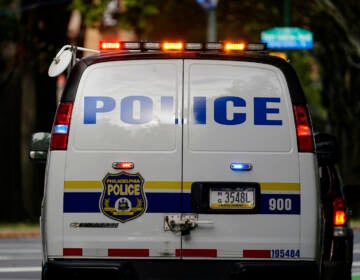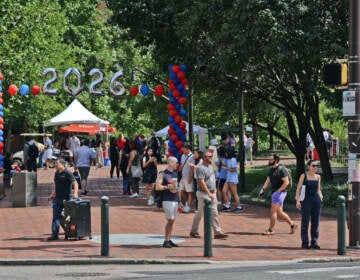Long-time elementary teacher prepares for seeing her students in person again
From hand-washing schedules to spare masks, Mattie Davis is has started getting ready for an unusual back to school season.
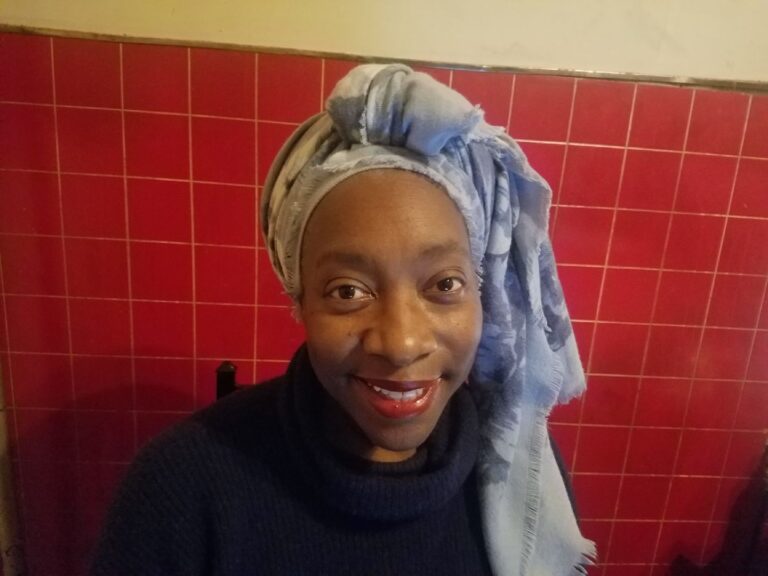
Mattie Davis, 59, has been teaching in North Philadelphia for 29 years. (Photo by Bernadette Golden)
Since mid-April, Notebook Contributing Editor Dale Mezzacappa has spoken to first grade teacher Mattie Davis nearly every day. She would call faithfully at 1 p.m. to recount her experiences of the prior day as she worked to keep in touch with families and make sure her children progressed. The first story was part of a project with WHYY to highlight how teachers were adjusting to the new reality of online learning. The second piece appeared in the Notebook’s spring print edition on educating during a pandemic. This story focuses on Davis’s plans and hopes for the future.
Mattie Davis has already figured out how long it will take her class of 23 or 24 six-year-olds to wash their hands before lunch. She has three faucets in the long sink in her spacious first grade classroom at the William Dick Elementary School at 25th and Diamond, and she has a plan to make it quick and orderly. It will take four, maybe five minutes for the project to be done, she said.
A week ago, she bought herself a face shield. She shopped on Amazon to find a good one. It is her job and privilege to teach her students to read, “and when it comes to them seeing you, when you’re having a small group, and you’re having phonemic awareness activities, they need to see how you’re forming your mouth when you’re doing blends, and digraphs, and those types of things.” She can’t do that with a regular mask on.
She also bought masks for her children, “as a precaution, because what’s going to happen when we get back to school, and little so-and-so doesn’t have a mask, or” – and here she does her best imitation of a tiny child peering up at her – “Miss Davis, at recess I lost my mask!”
But planning for proper hygiene and safety and cleaning is not the only preparation the 29-year classroom veteran is doing. She also dug out her copy of Ta-nehisi Coates’ “Between the World and Me.” In the five-plus years the book has been out, she hadn’t found the time before now to sit down and read it, but she knows that she can put it off no longer. In the book, which won the National Book Award, the author tries to help his 15-year-old son make sense of blatant racial injustice.
Davis is 60, a lifelong resident of Strawberry Mansion, and a teacher for half her life. Her entire career has been in first or occasionally second or third grade in North Philadelphia, either at Dick or, before that, at Frederick Douglass Elementary
Completing the school year online was the most exhausting experience of her long teaching career. “Well, I’m glad it’s over, and that’s the first time I’ve had to say that as a classroom teacher,” she confessed.
By the end of the official school year on June 12, she had succeeded in having regular conferences with all but two of her 23 students. Sometimes, she had as many as eight in one day. She tracked the families down, helped them get their Chromebooks, and then their P-EBT cards. If a child was spending time with a relative, she got permission to reach them there. For a long time it was a blur of phone calls and texts and missed signals, but she never gave up.
“At the end of the day, even though this was one for the books in the different things that one had to go through, the fact is that we made it, and I’m just hoping to have some type of outreach to parents that want it during the summer.”
And the fall? There are so many things to prepare for.
She pays attention to detail, and so she has been thinking about a lot of things. Like building frequent hand-washing into the day. She reminds herself to make sure the sink is maintained. “I hope that third faucet works, cause that way we can [do it] quickly if three children go up the same time, and they’re not next to each other, there’s a nice little space in between, it’s a nice long sink.”
And the need to constantly clean all the playground equipment, which is not only used by students but by neighborhood residents. And to have the specialist teachers, like art, music and computers, come to the children rather than the children going to them. Can’t have too many bodies sitting in the same chairs during the day, she notes.
And how do you get six-year-olds to socially distance? “Well, we’re just going to have to talk about that,” she laughs. “I’m hoping to do it through song…I’m hoping to talk with them about how we make sure we want to learn as much as we can, and even as teachers, I normally call myself old Ms. Davis, as old as I am, I’m learning new things.”
With little children, she adds, “you never know when they’re going to grab you and give you a hug. That’s something that we’re going to have to talk about.”
She will miss the hugs. What she craves most is being with her students. Since being forced to teach online, “I did embrace the technology, and learned more than I ever thought I would.” Still, it wasn’t the same. “There’s nothing like students being with their teacher in a classroom, there’s no substitute for it.”
As for the coronavirus, she trusts that both the schools and families have learned enough to take the proper precautions “to lessen the chances.”
So, yes, she said, she anticipates doing in-person teaching in the fall. She relishes it, almost – so many things to talk about with her children, so many teachable moments.
When she went shopping for a face shield, for instance, “I was looking at a lot of the reviews, [they said] ‘oh, don’t get this one, it looks nice, but it’s cheaply made.’ And then having those kinds of conversations with the children, not going into detail, but just letting them know, you have to be able to read and embrace learning to read, because reading gives you great information so you can make great decisions.”
Bigger than that, there is the country’s reckoning with racism to confront, with young children in one of the city’s poorest, most segregated neighborhoods.
It’s not like she never talked to her first graders before about discrimination and racism, although she might not have called it that. Dick’s student population is almost entirely Black, with a smattering of mixed race and Latino children. And it is overwhelmingly low-income. “Sometimes the children will say ‘we don’t have any white children here,’” she said.
Explaining why to six-year-olds is not an easy conversation. As a child she was well aware of the white flight that swept Strawberry Mansion when families like hers moved in during the 1950s. She herself attended almost completely segregated schools until Girls High.
She tells them things she thinks they can understand. When she is teaching them to read, she relies on a painful history lesson. “At one time in our country, there were people who looked like Ms. Davis who couldn’t do certain things because it was against the law to learn to read. And they’ll go, ‘that’s stupid,’ and I’m like, ‘Isn’t it silly? That doesn’t make any sense. So that’s why you need to embrace reading, because there was a time when it was against the law.’ So we talk about these types of things.”
But never, she said, “with the aim of trying to say that all people who look a certain way were good, or all people who look a certain way were bad.”
This year, after George Floyd and the ongoing reckoning over the country’s racist underpinnings, they might be more acutely aware of discrimination. They may ask more questions. And what will she tell them?
“You keep talking to them about how people are the same but we’re different. And then how some people keep more emphasis on the difference [as opposed to recognizing] that we all bleed, we all sleep, we all eat…we all sometimes get sick, we all have happy times, sad times, amazing times.”
And then she uses the garden analogy, that “some of the most beautiful gardens have all these different colors and shades, big plants, little plants, leafy plants, plants with little stubs on them, and that’s what makes it so beautiful, because of its diversity. But with all of that, you might have to water this one more, that one less, but the fact is they still need water. We talk about differences and sameness.”
For what in-person school will look like in the fall, Davis can’t say. She doesn’t know what the School District will decide regarding staggered schedules and transportation, or what the conditions will be at Dick. Whatever happens, her children, she hopes, will not only observe social distancing and hand-washing rules, but absorb deeper lessons.
“I’m going to go back, Lord willing, if the Lord lets me. I don’t know from here to there, but that’s what I’m praying and planning to do.”

Get daily updates from WHYY News!
WHYY is your source for fact-based, in-depth journalism and information. As a nonprofit organization, we rely on financial support from readers like you. Please give today.


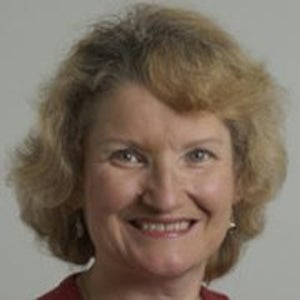
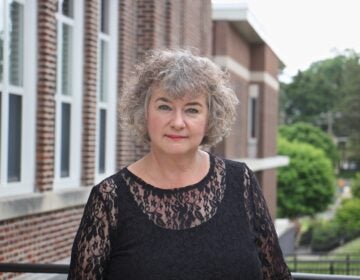
![CoronavirusPandemic_1024x512[1]](https://whyy.org/wp-content/uploads/2020/03/CoronavirusPandemic_1024x5121-300x150.jpg)
